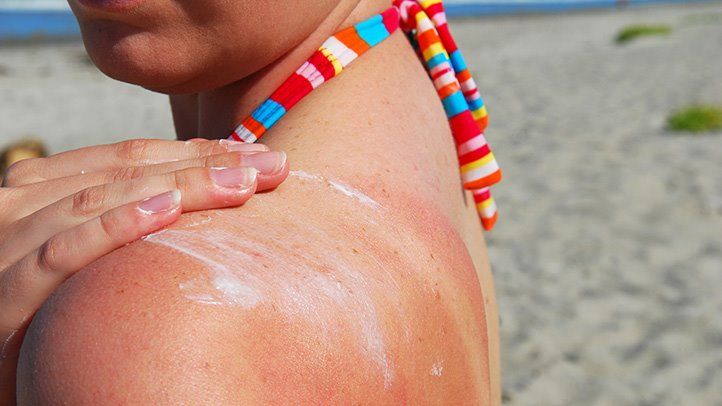
Why You Still Get Burned When Using Sunscreen
For years you’ve heard our dermatologists at Genesis Dermatology in Jupiter warn you never to set foot outside—or sit near windows in the sun—without applying a sunscreen of at least 30 SPF.
And you do, but burn anyway. So what happened? There are several possible reasons for this.
You don’t use enough
Probably the number one reason why people burn despite using sunscreen is that they use too little. The American Academy of Dermatology (AAD) recommends you use enough sunscreen to cover all exposed skin.
For most adults, this means applying about an ounce: equivalent to a shot glass full of sunscreen. AAD says most people apply only about 20-50 percent of the amount of sunscreen needed to achieve the amount of SPF on the product’s label.
The SPF is too low
The sun protection factor (SPF) is a measure of how much protection a sunscreen offers.
For most people, an SPF of 30 is adequate, but for those with lighter skin, or who may be photosensitive, a higher-number SPF may be a better choice.
And the AAD notes that, no matter how high the SPF, no sunscreen can block 100 percent of the sun’s UVB rays, so they recommend wearing protective clothing and hats if you’ll be outside for an extended period. Also, a higher-number SPF doesn’t allow you to spend more time outdoors without reapplication.
You apply it too late
Sunscreen first needs to be applied at least 15 minutes before you head outdoors (30 minutes is better). This allows your skin to fully absorb it in time to offer complete protection.
You don’t reapply often enough
Once it’s on your skin, it doesn’t stay there. Swimming and sweating will wash most of it away, so you need to reapply at least every two hours.
And don’t depend on those labeled “waterproof” or “water resistant” to keep you from reapplying. These haven’t been proven to withstand the rigors of outdoor exposure.
You miss important parts
Too many people forget about covering certain areas of the body:
- the top of the head of balding men
- the part in their hair and the hairline
- their ears, especially the tops
- sides and back of the neck
- back of the legs
- lips and the area between the lips and the nose
- the area around the eyes as well as the eyelids
- tops of hands
- tops of feet
You’re using the wrong kind
You need a “broad spectrum” sunscreen for full protection. That is, a sunscreen that combines UVB as well as UVA protection. Check the label.
Also under this heading are sunscreens that don’t perform as promised on the label.
One 2016 Consumer Reports (CR) study found that, of the more than 60 lotions, sprays, sticks, and lip balms they tested, 23 actually tested at less than half their labeled SPF number. (Find CR’s list of recommended sunscreens here.) (https://www.consumerreports.org/products/sunscreens-34523/sunscreen-33614/view2/)
You’re using expired sunscreen
Like most drugs, including those sold over the counter (OTC), sunscreen has a certain shelf life, and manufacturers have tested their products to discern how long that is.
So always check the expiration date before depending on the sunscreen. For those that don’t contain an expiration date, write the date you bought it on the container. The U.S. Food and Drug Administration (FDA) requires that all sunscreens retain their original strength for at least three years.
If you’ve stored it in the car or anywhere at higher temperatures, however, it’s likely to lose its potency faster than the expiration date because heat breaks down the chemicals more rapidly. The ideal storage temperature is 77 degrees Fahrenheit.
If it has an odd odor, color, or consistency, chances are it’s too degraded to use.
Certain drugs are interfering
There are a number of drugs that can interfere with sunscreen protection, and/or make your skin more susceptible to sunburn.
These include antibiotics, which can cause you to burn faster than normal. And it can take up to a month for these drugs to leave your system.
Other types of drugs that can make your skin more sun-sensitive include tricyclic antidepressants, antihistamines, antifungal and antimalarial medications, and those for acne, autoimmune conditions, diabetes, and heart medications.
To be sure, check with your pharmacist or read the prescribing information for any prescription drug you’re taking to see whether it can cause photosensitivity.
You save it for the beach
The sun’s rays can penetrate glass, so if you sit by a window—especially in an office for eight or more hours a day—you’re being exposed to the harmful UV rays.
Be aware that UV rays can not only penetrate glass but also can “bounce” under beach umbrellas, and reflect off of concrete surfaces or snow.
For the best protection, we recommend applying an SPF of at least 30 to all exposed areas every day you’re outside.

